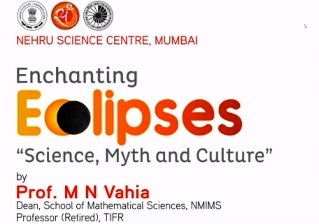According to Prof. Vahia, there is no religious text that claims that eclipses are dangerous. They are mere superstitions created by people who are scared of the eclipses.
 KRC TIMES Desk
KRC TIMES Desk

“Eat and drink as much as you like and enjoy this rare celestial event”, Professor M N Vahia, Dean School of Mathematical Sciences, NMIMS said busting all the myths behind eclipses observed in India.
He was addressing Enchanting Eclipses – Science, Myth and Culture lecture organised by Nehru Science Centre, M/o Culture ahead of the eagerly awaited first Solar eclipse of 2020 to occur on 21st June.
According to Prof. Vahia, there is no religious text that claims that eclipses are dangerous. They are mere superstitions created by people who are scared of the eclipses. “On the contrary, we can even see how eclipses have been beautifully discussed in ancient literature”, he added. “No scriptures recommend hiding away during its occurrence. One should have more faith and understanding about the working of the universes and not be carried away by superstitions”.
We are not that important.
Unlike the common belief, the sun does not send any special radiation during the eclipse. Even though we call it a Solar Eclipse, the sun is completely unaware of its occurrence. The sun is too big to be bothered about where the moon’s shadow falls. “We are exaggerating our own sense of importance in the universe. Eclipse is a small drama and to the Universe, it is an irrelevant phenomenon,” he said rejecting the false claims about impacts of eclipses on human life.
He also mentioned that we do not get to see many eclipses in our lifetime and hence one should not miss this rare opportunity that occurs every 18 years. We should not waste it by hiding in the house and staying hungry fearing myths being imposed on us.
“Eclipses are fantastic to see but it is not worth losing your eyes”, he cautioned about seeing the eclipse with naked eyes. The safest way of looking at the eclipse is through pinhole cardboard by getting it projected it on the screen.



